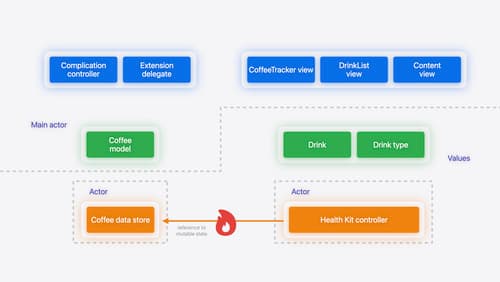how to don't initialize object is some of the properties is nil decodable
Asked on 2024-08-22
1 search
To handle the initialization of an object in Swift when some properties might be nil, you can use a failable initializer. A failable initializer allows you to return nil if the initialization cannot be completed due to some invalid or missing data. This is particularly useful when dealing with optional properties.
Here's a brief explanation based on the content from WWDC:
In Swift, you can create a failable initializer by using the init? syntax. This initializer can return nil if any of the required properties are not available or valid. This approach is useful for preventing resource leaks or invalid states when initializing objects.
For example, if you have a file type that should only be initialized if a valid file name is provided, you can use a failable initializer to ensure that the object is only created when all necessary conditions are met. This is discussed in the session What’s new in Swift.
Additionally, Swift's optionals are designed to handle cases where a value might be absent. You can use optional binding with if let or guard let to safely unwrap optionals and handle the case where a property might be nil. This is covered in the session A Swift Tour: Explore Swift’s features and design.
By using these techniques, you can ensure that your Swift code is robust and handles all possible states of your objects.

Migrate your app to Swift 6
Experience Swift 6 migration in action as we update an existing sample app. Learn how to migrate incrementally, module by module, and how the compiler helps you identify code that’s at risk of data races. Discover different techniques for ensuring clear isolation boundaries and eliminating concurrent access to shared mutable state.

What’s new in SwiftData
SwiftData makes it easy to add persistence to your app with its expressive, declarative API. Learn about refinements to SwiftData, including compound uniqueness constraints, faster queries with #Index, queries in Xcode previews, and rich predicate expressions. Join us to explore how you can use all of these features to express richer models and improve performance in your app. To discover how to build a custom data store or use the history API in SwiftData, watch “Create a custom data store with SwiftData” and “Track model changes with SwiftData history”.

A Swift Tour: Explore Swift’s features and design
Learn the essential features and design philosophy of the Swift programming language. We’ll explore how to model data, handle errors, use protocols, write concurrent code, and more while building up a Swift package that has a library, an HTTP server, and a command line client. Whether you’re just beginning your Swift journey or have been with us from the start, this talk will help you get the most out of the language.
